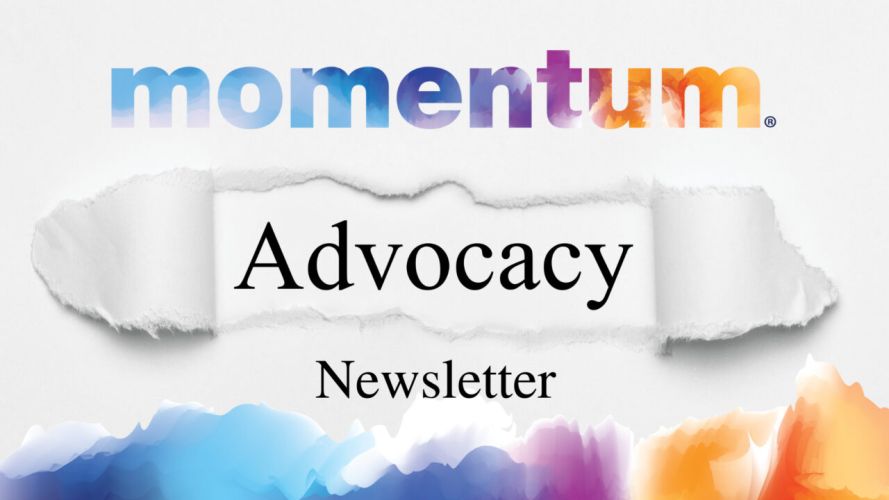
July 2023

A Note from the CEO…
July 26 marks the 33rd anniversary of the signing of the Americans with Disabilities Act (ADA) intended to end discrimination against individuals with disabilities in all areas of public life. President George H.W. Bush was joined by Justin Dart, the “Father of the ADA” and ADA’s Congressional sponsors Senators Lowell Weicker and Tom Harkin, as well as Representatives Silvio Conte and California’s Tony Coelho.
This landmark legislation greatly expanded community accessibility for people with disabilities leading to greater independence, increased participation in the labor market, expanded access to public education and real engagement in neighborhood activities, for people with disabilities. But, thirty-three years later, many people with disabilities remain isolated due to gaps in the ADA and the failure of leaders to adopt innovative technologies to refine our concept of “reasonable accommodations.”
We truly honor the legacy of those leaders 33 years ago who fought so hard for passage of the ADA by, not only acknowledging their contributions, but continuing their fight to expand the provisions of the ADA to create a genuinely accessible and equitable nation in which all people are respected and welcomed.
Lori Anderson, President & CEO

Momentum’s VoterVoice Advocacy Center
Advocacy Contacts
Governor Gavin Newsom
Phone: (916) 445-2841
Fax: (916) 558-3160
Internet Contact Form Access – Here
Twitter Accounts:
@GavinNewsom
@CAgovernor
Facebook:
@GavinNewsom
Find Your Representatives
U.S. House of Representatives
U.S. Senate
California State Legislature
California News
Disability, Equity and Accountability Act Unanimously Approved by Senate Human Services Committee
AB 1147, the Disability Equity and Accountability Act, introduced by Assemblymember Dawn Addis (Central Coast), has been approved unanimously by the California Senate Human Services Committee. AB 1147 is intended to strengthen the ability of the California Department of Developmental Services (DDS) to provide effective oversight of the twenty-one regional centers (RCs).
AB 1147 focuses on three fundamental areas for people served by RCs:
1. Equity – People served by regional centers receive equal and timely access to services regardless of their race, ethnicity, disability, or location by requiring DDS to establish a minimum set of specific services that all RCs must provide;
2. Accountability – The state looks more closely at how RCs are serving their clients and holds them responsible for how clients are treated and served by requiring DDS to establish targets/standards above which an RC may receive rewards for good performance, and a separate set of standards below which the regional center is subject to levels of probation and required corrective action;
3. Transparency – Clients and families have more opportunities to see how they are individually served and how their RCs are serving all clients through a modern technology system and added transparency.
AB 1147 now moves to the Senate Appropriations Committee before moving to the floor. Your voice is still needed to pass this important initiative. All advocates are urged to take action today by visiting Momentum’s VoterVoice online advocacy center.
California Legislature and Newsom Administration Reach Agreement on FY2023-24 State Budget
The California Legislature and Governor Gavin Newsom have reached agreement on the FY2023-24 state budget which was finalized and signed on June 27.
The budget addresses a $32 billion state budget deficit, with projected multiyear deficits, through selected spending cuts and delays. The final budget agreement does not touch state reserves, and, for the most part, spares disability services and supports from spending cuts.
Developmental disability advocates are heartened to learn that two priority issues have been addressed in the FY 2023-24 budget. The approved budget fixes a flaw in the current provider reimbursement rate models for independent living services by providing $15 million beginning January 2024 to increase the rate to ensure proper access to the services.
The budget also fixes a fundamental problem in the implementation of quality measures incentives in the rate study implementation. When implementation of the rate model study is complete, providers will receive a 90% “base rate” and a 10% quality incentive payment. However, quality incentive benchmarks have not been established for many services meaning those supports will not be eligible for the recommended rate. The FY 2023-24 addresses that concern:
- Requires Department of Developmental Service (DDS) to implement a hold harmless policy for providers whose rates in effect on January 1, 2023, exceed 90 percent of the rate model, until June 30, 2026.
- Requires that a provider be eligible for a quality incentive payment that, when added to their base rate, allows them to earn the fully funded rate model.
- Allows the department to establish quality measures or benchmarks in the initial years of the quality incentive program that focus on building capacity, developing reporting systems, gathering baseline data, and similar activities while working towards meaningful outcome measures at the individual consumer level for all services.
- Specifies that beginning in 2024-25, there will be an opportunity for eligible providers to earn full quality incentive payments through one or more measures.
- Requires the department to determine each provider’s quality incentive payment percentage prior to the start of the fiscal year by measuring the provider’s performance against the quality measure or benchmarks for the most recently available reporting period.
The budget for the DDS remained largely untouched during budget negotiations with most spending reductions reflected in downward projections of utilization of services.
National News
Advocacy Needed to Pass SSI Savings Penalty Elimination Act
Bipartisan advocates continue to fight for legislation to give people with disabilities and older Americans significantly more freedom to earn and save money without risking the loss of vital benefits, their livelihoods, and their ability to support themselves and members of their family.
The SSI Savings Penalty Elimination Act would increase Supplemental Security Income (SSI) asset limits for the first time since the 1980s. Proposed legislation would raise SSI asset limits from $2,000 to $10,000 for individuals and from $3,000 to $20,000 for married couples and would then index future increases to inflation moving forward. SSI provides money to eight million adults and children with disabilities and older Americans.
Disability advocates have long sought this update to SSI asset limits and to adjust for inflation moving forward, so that people with disabilities have added financial opportunities. You can urge passage of this bill by visiting Momentum’s online advocacy center.
Legislation to Eliminate Discrimination Against Parents and Guardians with Disabilities Introduced in Congress
Congresswoman Sheila Cherfilus-McCormick (D-FL) introduced H.R 4282, the Equality for Families with Disabilities Act. This legislation seeks to eliminate discrimination against parents and guardians with disabilities in state child welfare proceedings.
“Parents and guardians with disabilities will often face unreasonable scrutiny, being treated differently in child welfare proceedings and discriminated against by state agencies,” said Congresswoman Cherfilus-McCormick. “This legislation would address such prejudices and ensure that all parents receive the fair assessment they deserve.”
Parents and guardians with disabilities face excessive scrutiny from child welfare agencies. To combat this problem, this legislation will:
- Crackdown on discrimination against parents and guardians with disabilities by requiring individualized, fact-based evaluations of parenting capabilities to prevent state agencies from restricting parental rights solely based on disability status.
- Require state child welfare plans to include support for parents, guardians, and other caregivers with disabilities.
- Amend the Court Improvement Program (CIP) formula grants so that state courts can use the funding to assess the accessibility of state child welfare proceedings for parents and guardians with disabilities, and to implement improvements based on these assessments, such as sign language interpretation or other physical accessibility accommodations.
- Require state courts that receive CIP funds to demonstrate meaningful efforts to ensure full and equal participation for parents and guardians with disabilities in child welfare proceedings.
- Requires U.S. Department of Health and Human Services (HHS) and U.S. Department of Justice (DOJ), in consultation with relevant agencies, organizations, and individuals, to revise and update relevant technical assistance to include education and training materials for states.
“Our child welfare system has produced inequities and used discriminatory practices that unfairly target parents and guardians with disabilities,” said Congressman Adam Schiff (D-CA). “The Equality for Families with Disabilities Act cracks down on those practices and ensures states use fact-based evaluations rather than restricting parental rights due to disability status. Our children deserve the best, and often that is simply the unwavering love and support of their parents.”
The Equality for Families with Disabilities Act has been referred to the House Committee on Ways and Means.
Bill to Expand Accessible Transportation Options for Individuals with Disabilities Introduced in Congress
U.S. Senator Bob Menendez (D-N.J.) and Congresswoman Dina Titus (D-Nev.01) introduced H.R. 3845 / S. 1813, the Disability Access to Transportation Act (DATA). This bill has been drafted to address difficulties faced by individuals with disabilities when they use transportation services.
The Disability Access to Transportation Act includes:
- Findings that highlight the ongoing need to improve access to transportation systems for those with disabilities.
- The creation of a new one-stop paratransit pilot program authorized at $75 million annually through FY26, will allow for a brief stop on a multi-legged paratransit trip to prevent long wait times between having to book individual trip segments. This will allow people with disabilities to perform activities like stopping at a bank or pharmacy or dropping children off at daycare without needing to book two separate trips that could each take up to 90 minutes.
- Requires the Architectural and Transportation Barriers Compliance Board to finalize minimum standards for pedestrian facilities in the public right-of-way and requires the Secretary of Transportation to undertake a rulemaking to implement those standards.
- A provision to streamline the accessibility complaint reporting process at FTA; and
- The creation of an accessibility data pilot program to improve data collection and identify gaps in services to aid in transportation planning.
The bill has been referred to the House Transportation and Infrastructure Committee and the Senate Commerce, Science, and Transportation Committee.
Advocacy Opportunity & Resources
An Overview of the Americans with Disabilities Act
This overview, published by the ADA National Network, provides a high-level overview of the requirements of the Americans with Disabilities Act intended to end discrimination against individuals with disabilities in all areas of public life.
Click here to access this resource
MACPAC June 2023 Report to Congress on Medicaid and CHIP
The Medicaid and CHIP Payment and Access Commission (MACPAC) has released its June 2023 Report to Congress on Medicaid and CHIP. The report highlights recommendations in four areas: payment policy for safety net hospitals, integrated care for people who are dually eligible for Medicaid and Medicare, coverage for adults leaving incarceration, and access to Medicaid home- and community-based services (HCBS).
Click here to access the MACPAC Report
CMS Office of the Actuary 2022-2031 National Health Expenditure Projections
The Centers for Medicare & Medicaid Services’ (CMS) Office of the Actuary released projections of National Health Expenditures (NHE) and health insurance enrollment for the years 2022-2031.